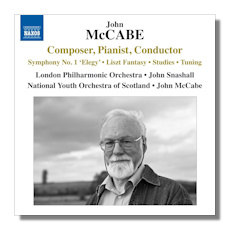
The Internet's Premier Classical Music Source
Related Links
- McCabe Reviews
- Latest Reviews
- More Reviews
-
By Composer
-
Collections
DVD & Blu-ray
Books
Concert Reviews
Articles/Interviews
Software
Audio
Search Amazon
Recommended Links
Site News
 CD Review
CD Review
John McCabe

Composer, Pianist, Conductor
- Symphony #1 "Elegy"
- Fantasy on a Theme of Liszt 1
- Piano Study #1 "Capriccio" 1
- Piano Study #2 "Sostenuto" 1
- Tuning 2
1 John McCabe, piano
2 National Youth Orchestra of Scotland/John McCabe
London Philharmonic Orchestra/John Snashall
Naxos 8.571370 62:21
Naxos bills these performances as world premieres. Well, the claim is certainly true but, paradoxically, the recordings are not new. All are reissues from other labels: Pye in 1967 (Symphony #1), RCA in 1977 (the various piano works) and Alpha Cassette in 1986 (Tuning). That doesn't detract from their value, however, as all the works feature good sonics for their time and the music should have appeal to those with an interest in compositions from the latter half of the 20th century. Moreover, except for the two Studies, the other works have apparently not been recorded since.
English composer John McCabe (b. 1939) writes in a somber though certainly not aggressively modern style: in a way, his Symphony #1 (1965) is fairly simple in its forms and themes. Yet, it's one of those works that may have to be explained in detail for you to fully grasp its music. Cast in three movements and lasting under twenty minutes, the symphony is subtitled "Elegy", which gives you an idea of the sad and tragic mood of the piece. The first movement is slow and tense, as throbbing percussion and bell-like sonorities lament. The music builds inexorably as it gains energy and works toward what might be a catharsis of sorts, but at the climax the music retreats to the opening sense of lamentation. The middle panel has an almost militaristic quality about it as once again the music seems to be building toward some resolution. Angry brass repeat an insistent motif that resembles a fragmentary theme out of the first movement of Shostakovich's 1963 Symphony #13. (McCabe almost certainly could not have been familiar with this work, as its UK premiere came in 1971.) Other winds menace and the movement climaxes in a repetition of that angry brass motif. The finale begins in an austere mood, with a bassoon soon recalling thematic material from the work's opening. The brass are agitated as if reeling from the unresolved tension of the previous movement. Strings seem to wander for a time and midway through an infusion of energy leads back to the second movement motif. The movement ends quietly and desolately. The performance by the London Philharmonic Orchestra is commited and well conducted by John Snashall.
The piano works on this disc also have a sort of somber or austere quality, but are more successful and, despite their general gloom, more colorful. The Fantasty on a Theme of Liszt (1967) doesn't sound like Liszt at all, though it's based on material from the opening of the Faust Symphony. While it may not resemble Liszt's style, it certainly sounds quite difficult to perform. It's well crafted and often quite thrilling music, though in the latter half of the piece things seem to bog down for a while. However, energy returns with a passage that recalls Baba Yaga from Mussorgsky's Pictures at an Exhibition. All in all, this is a fine piece and McCabe's performance is excellent. The two Studies (1969), Capriccio and Sostenuto, are more ethereal and ponderous in character. In the end, they sometimes do sound like "studies", with several passages bordering on stasis. Still, they are reasonably well crafted and the performances by McCabe are just fine. In general, McCabe's piano works here strike you as if much is happening beneath the surface: rarely have I heard music that often seems to pose a question, with only half-answers following. McCabe isn't afraid to take chances with his audience's attention span as he presents his ideas, profound and provocative as they often are.
Tuning (1985) is the closing work on the disc. It is a colorful, lighter work than the First Symphony, and is inspired by the idea of an orchestra tuning up before performance. It is a busy, energetic work brilliantly scored and full of twists and turns. Contrasts in the scoring between the tuba and strings are striking and some of the percussion sounds, particularly by wood blocks and xylophone, are cleverly imagined. Frenzied brass bring on a great explosion at the end of the piece. This fine performance was recorded live at the Glasgow City Hall on January 4, 1986, with the composer leading the National Youth Orchestra of Scotland. Well, there you have it: this is an interesting compilation of works by a lesser known but worthwhile composer who may offer considerable rewards to the patient listener.
Copyright © 2015, Robert Cummings




















